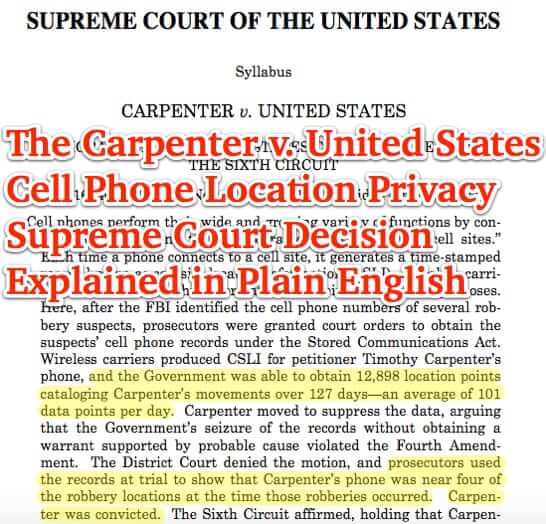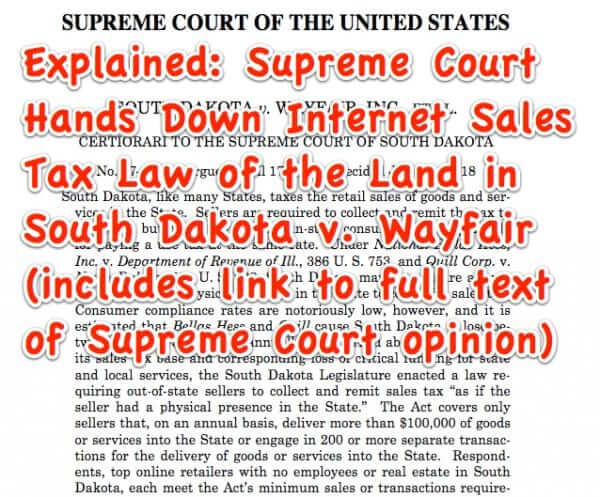Tag: supreme court
Data Broker was Selling Location-Tracking Data of People Visiting Abortion Providers
So a date broker was selling the location-tracking data of people visiting abortion providers. Data about all sorts of things holds value, and in today’s world, your data holds plenty. Like it or not, your data has almost definitely already been bought and sold. Just like mine, just like nearly every other person’s in the good ol’ US of A. Of course, it would be nice if you or I had some say in the matter. Personally, I would not freely consent to my data being bought or sold without providing me a benefit, and that is precisely the reason why I don’t have any say in the matter.
The Carpenter v. United States Cell Phone Location Privacy Supreme Court Decision Explained in Plain English (plus link to full text of decision)
In a fairly stunning win for mobile phone privacy, the Supreme Court has ruled that law enforcement agencies must obtain a warrant before they can demand and receive from mobile carriers and mobile providers access to the cell phone location data (known as ‘cell site location information’, or CSLI for short) of a given cellular phone. In the case of Carpenter v. United States, the Supreme Court held that tracking a cell phone is barely different than putting an ankle bracelet on an individual and monitoring their movements, and so overturned related case law that has been around for (up to) decades.
Explained: Supreme Court Hands Down Internet Sales Tax Law of the Land in South Dakota v. Wayfair (includes link to full text of SC opinion)
With today’s Supreme Court decision in the Wayfair v. South Dakota case, the Supremes have cleared the way for states to collect sales tax from Internet-based merchants who do not have a physical presence within the state; however the ruling is quite narrow in its scope and so does not open the floodgates for states to tax anybody and everybody who arguably does business online within a given state. Read on for a plain English explanation of this Internet sales tax decision, as well as a link to the full South Dakota v. Wayfair decision and the dissenting opinions.
Fight Over Access to Dead Person’s Email Heads to Supreme Court
What happens to your email after you die? Can the executor of your estate (or the administrator if you die without a will) gain access to your email account and read all of your email? That is the question at the heart of a lawsuit, Ajemian vs. Yahoo, that is heading to the Supreme Court, assuming that the Supreme Court agrees to hear it.
Paternity Notice on Facebook not Enough for Termination of Parental Rights, Rules Court
The Supreme Court of Oklahoma has ruled that telling someone on Facebook that they are the father of your baby is not sufficient notice of paternity to then be able to put the baby up for adoption without their consent. The ruling came in the case of Billy McCall and Marshall and Toni Andrews, the putative adoptive parents of his two-year-old daughter, who was surrendered to them by her unnamed teenage mother (identified in the case only as “T.Z.”) with no notice to McCall.
Federal Courts Finally Providing Relief from Patent Trolls
At last, software patent trolls are getting a smackdown. A few short months ago, the Supreme Court rendered an opinion in the case that has come to be known as Alice vs. CLS Banks. In that ruling, the Supremes held that taking an already widely-used practice, and moving it to a computer, does not create a new, patentable invention deserving of a software patent.
The Supreme Court Cell Phone Search Decision in Riley in Plain English
Today the Supreme Court unanimously held that a warrant is required to search a cell phone, in the case of Riley v. California. Warrentless searches of a cell phone are not ok.
The Aereo Supreme Court Decision in Plain English
This morning the Supreme Court handed Internet television service Aereo their head on a platter. In a 6-3 decision, the Supreme Court held that Aereo was in violation of copyright law when it rebroadcast network television shows without permission from, or paying royalties to, the networks and other copyright holders of the material that Aereo was rebroadcasting to its subscribers.
Employee Has No Right of Expectation of Privacy for Text Messages, Says U.S. Supreme Court
In a unanimous decision today, the United States Supreme Court has held that a government worker had no right to an expectation of privacy when it came to whether or not his employer might review the content of his text messages that were sent and received on employer-provided equipment, even those messages sent while he was off-duty. In the case of City of Ontario v. Quon, the Ontario California Police Department reviewed text messages sent and received by their employee, Officer Jeff Quon, on the text pager which was provided to Quon by the Ontario PD, including messages sent while Officer Quon was off-duty. Quon objected, but the Supreme Court held that Quon had no legitimate expectation of privacy.











